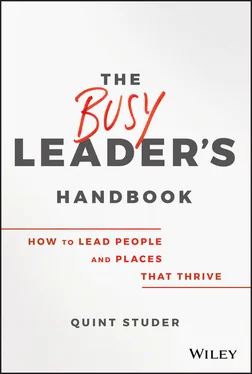Finally, Section 3 addresses strategic and foundational topics.These chapters focus on the structure, processes, and groundwork that need to be in place if you’re to build a successful organization. Why do we cover these last? Simply because without the efforts of leaders and employees there would be no company to run!
While it would be terrific if people read cover to cover, it’s not necessary. This is a reference book and chapters are designed to be self-contained. Feel free to read the topic (or topics) you need help with in the moment and save the rest for another day. (Also, don’t be surprised if you notice some crossover. Leadership is organic and its components interconnected: topics don’t fall neatly into categories!)
Whether you’re a new leader or a more seasoned one, I hope you will benefit from this book. Feel free to share it with other leaders and managers inside your company. The more people who embrace the proven principles of great leadership, the stronger your business will be.
I wish you and those you lead much success and fulfillment on your journeys. Leadership is a noble calling and if this book can play a small role in helping you do it better, I will be so grateful.
Quint Studer
“Wait . . . Didn’t I Read This in Another Chapter?”
It would be great if you read this book straight through from beginning to end! But we know leaders are busy (it says so right in the title!) and don’t always do it that way. That’s why The Busy Leader’s Handbook is written the way it is. It’s set up so you can jump right to whichever chapter you need in the moment. As a result, cover-to-cover readers may find that certain tactics are repeated in more than one place.
What’s more, actions that strengthen one leader’s skill or behavior quite often strengthen others as well. It just works out that way. It’s a good thing that so many tactics function organically to improve your leadership in several different areas: they give you more bang for your leadership buck!
Thank you for reading this book. We wish you all the best on your journey to becoming the best leader you can be.
I The Leader in You:
Key Skills and Behaviors
These chapters are all about the mind-set, attitude, and capabilities the best leaders possess. We all need to become the best leaders we can be before we can bring out the best in others. When we master these skills and behaviors, we lay the groundwork for a thriving organization.
1 Strive to Be Self-Aware and Coachable
Recently in a conversation with a venture capitalist, we were talking about the qualities he looks for when he is thinking about buying a company. I suspected that he would focus on things like profitability and growth potential. But to my surprise he put self-awarenes s and coachability in leaders at the top of the list.
I’ve met and worked with hundreds of leaders over the years—in hospitals, on baseball fields, in government offices, and in hotels, stores, and restaurants—and have seen what self-awareness and coachability look like in action. Organizations that encourage and nurture these two qualities in their leaders (actually, in all employees) tend to be strong, innovative, and profitable.
This should come as no surprise. Today’s business environment requires us to adapt quickly and relentlessly. That means leaders must not only be great at what they do, they also have to be great learners. “They must know what they don’t know”—and be willing to work hard to learn it.
Self-awareness means knowing what you’re good at and what you’re not. It means you don’t hide your flaws or cover up your mistakes. You don’t pretend to know it all. It means you practice humility and embrace learning. Not only do transparency and vulnerability help people like and trust you, they set the right example for other leaders and employees. When everyone is willing to take risks, learn from mistakes, and seek out opportunities to learn and grow, organizations thrive.
Coachability just means you’re open to feedback. You don’t get bent out of shape by constructive criticism. You’re actually grateful for it because you want to improve and grow, personally and professionally. You want to be a better leader, spouse, partner, parent, or friend (and you know that growth impacts all of these roles).
Self-awareness and coachability are connected. Each one leads naturally to the other. When we know what we need to improve on, we’re more likely to seek the help of others who can coach us. Once we seek that help we become even more self-aware. It’s a cycle that builds on itself. The hardest part is getting started, but it gets easier.
When these two qualities become part of your company’s culture, you’re on your way to becoming an unstoppable organization. It’s easier to engage and motivate employees. High performers will be drawn to you (and will be more likely to stick around). Productivity will soar.
All of this can start with one leader. By improving your own performance and setting an example for others by working to become more self-aware and coachable, you will inspire others to do the same. In fact, if you want to help others improve, this is not optional. Here is a story to illustrate what I mean:
Years ago, I was working in an alcoholism and drug addiction treatment center. I met the daughter of one of our patients, a single mom with her child’s father out of their lives. This daughter was struggling in many ways, even blaming herself for her mother’s drinking. I happened to know a guidance counselor at this daughter’s high school who had shared with me several months earlier that she herself had grown up in an alcoholic home. I thought the guidance counselor would be a perfect person to talk to the patient’s daughter.
When I called her and asked, the guidance counselor paused. She apologized, saying she could not talk to this girl because she (the guidance counselor) had not yet even addressed her own issues. For close to 30 years, this story has stuck with me. It’s hard to take another person further than you take yourself.
Here are a few tips for becoming more self-aware and coachable:
Know that getting better starts on the inside. It’s not “them,” it’s you. When I was younger I lived in the world of “if only.” If only I had gone to this school, majored in this, grown up rich, gotten the breaks, or been more appreciated then my life would be better. The problem was always them. Then, at 31, I crashed emotionally. I sought professional help and found other resources to learn from. I soon discovered the problem was not them; it was me and my expectations. I figured out that I will struggle until I am better on the inside.
Ask for feedback (and really listen). Talk to your boss, to other leaders, to employees, to friends and family members. Ask what they see as your strengths and weaknesses. How do they think you performed on a recent project? What might you have done better?
Don’t shoot the messenger. When you receive negative feedback, practice listening without reacting. If you feel yourself getting upset, don’t lash out. Process the information and sit with it a while before deciding whether it’s valid. Often you’ll have to admit it is. It’s hard to hear negative truths about ourselves but, with practice, we can become more open to it.
Have a “beginners mind-set.” People who practice “beginners mind” rather than always thinking they are going to be a guru or expert tend to do better in teams. Always be ready and willing to participate, serve, and share your best insights. You will learn a lot more. For example, check your attitude before you go to a meeting. Always come into the group with the intention of learning something. Rather than having attitude of This isn’t relevant to me or This is not what I’m interested in, ask yourself, How could this apply to me? How could this be useful for me now—and if not now, later?
Читать дальше












